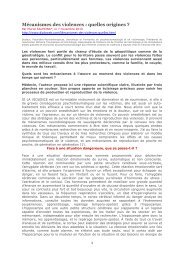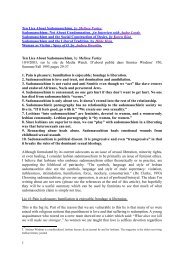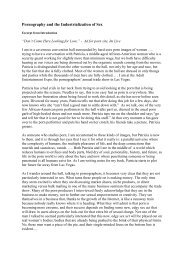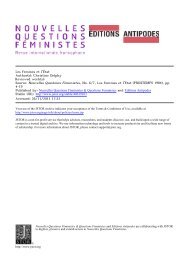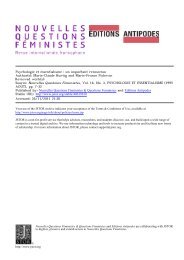- Page 1 and 2:
BY THE WINNER OF THE 2009 RACHEL CA
- Page 3 and 4:
Also by Marie-Monique RobinVoleurs
- Page 5 and 6:
The New Press gratefully acknowledg
- Page 8 and 9:
ContentsPreface: A Book for Public
- Page 10 and 11:
PrefaceA Book for Public HealthNico
- Page 12 and 13:
prefacexirifying reality. For, in t
- Page 14 and 15:
IntroductionThe Monsanto Question
- Page 16 and 17:
introduction 3as “an agricultural
- Page 18 and 19:
introduction 5Confronted with this
- Page 20:
part iOne of the Great Pollutersof
- Page 23 and 24:
10 the world according to monsantol
- Page 25 and 26:
12 the world according to monsantol
- Page 27 and 28:
14 the world according to monsantoi
- Page 29 and 30:
16 the world according to monsantoo
- Page 31 and 32:
18 the world according to monsantot
- Page 33 and 34:
20 the world according to monsantob
- Page 36 and 37:
pcbs: white-collar crime 23nately,
- Page 38 and 39:
pcbs: white-collar crime 25United S
- Page 40 and 41:
pcbs: white-collar crime 27that Mon
- Page 42 and 43:
pcbs: white-collar crime 29PCBs Are
- Page 44 and 45:
dioxin: a polluter working with the
- Page 46 and 47:
dioxin: a polluter working with the
- Page 48 and 49:
dioxin: a polluter working with the
- Page 50 and 51:
dioxin: a polluter working with the
- Page 52 and 53:
dioxin: a polluter working with the
- Page 54 and 55:
dioxin: a polluter working with the
- Page 56 and 57:
dioxin: a polluter working with the
- Page 58 and 59:
dioxin: a polluter working with the
- Page 60 and 61:
dioxin: a polluter working with the
- Page 62 and 63: dioxin: manipulation and corruption
- Page 64 and 65: dioxin: manipulation and corruption
- Page 66 and 67: dioxin: manipulation and corruption
- Page 68 and 69: dioxin: manipulation and corruption
- Page 70 and 71: dioxin: manipulation and corruption
- Page 72 and 73: dioxin: manipulation and corruption
- Page 74 and 75: dioxin: manipulation and corruption
- Page 76 and 77: dioxin: manipulation and corruption
- Page 78 and 79: dioxin: manipulation and corruption
- Page 80 and 81: dioxin: manipulation and corruption
- Page 82 and 83: 4Roundup: A MassiveBrainwashing Ope
- Page 84 and 85: oundup: a massive brainwashing oper
- Page 86 and 87: oundup: a massive brainwashing oper
- Page 88 and 89: oundup: a massive brainwashing oper
- Page 90 and 91: oundup: a massive brainwashing oper
- Page 92 and 93: oundup: a massive brainwashing oper
- Page 94 and 95: oundup: a massive brainwashing oper
- Page 96 and 97: oundup: a massive brainwashing oper
- Page 98 and 99: oundup: a massive brainwashing oper
- Page 100 and 101: oundup: a massive brainwashing oper
- Page 102 and 103: 5The Bovine Growth Hormone Affair,P
- Page 104 and 105: the bovine growth hormone affair, p
- Page 106 and 107: the bovine growth hormone affair, p
- Page 108 and 109: the bovine growth hormone affair, p
- Page 110 and 111: the bovine growth hormone affair, p
- Page 114 and 115: the bovine growth hormone affair, p
- Page 116 and 117: the bovine growth hormone affair, p
- Page 118 and 119: the bovine growth hormone affair, p
- Page 120 and 121: the bovine growth hormone affair, p
- Page 122 and 123: the bovine growth hormone affair, p
- Page 124 and 125: the bovine growth hormone affair, p
- Page 126 and 127: the bovine growth hormone affair, p
- Page 128 and 129: the bovine growth hormone affair, p
- Page 130 and 131: the bovine growth hormone affair, p
- Page 132 and 133: the bovine growth hormone affair, p
- Page 134 and 135: the bovine growth hormone affair, p
- Page 136 and 137: the bovine growth hormone affair, p
- Page 138 and 139: the bovine growth hormone affair, p
- Page 140 and 141: the bovine growth hormone affair, p
- Page 142: part iiGMOs: The Great Conspiracy
- Page 145 and 146: 132 the world according to monsanto
- Page 147 and 148: 134 the world according to monsanto
- Page 149 and 150: 136 the world according to monsanto
- Page 151 and 152: 138 the world according to monsanto
- Page 153 and 154: 140 the world according to monsanto
- Page 155 and 156: 142 the world according to monsanto
- Page 157 and 158: 144 the world according to monsanto
- Page 159 and 160: 146 the world according to monsanto
- Page 161 and 162: 148 the world according to monsanto
- Page 163 and 164:
150 the world according to monsanto
- Page 165 and 166:
152 the world according to monsanto
- Page 167 and 168:
154 the world according to monsanto
- Page 169 and 170:
156 the world according to monsanto
- Page 171 and 172:
158 the world according to monsanto
- Page 173 and 174:
160 the world according to monsanto
- Page 175 and 176:
162 the world according to monsanto
- Page 177 and 178:
164 the world according to monsanto
- Page 179 and 180:
166 the world according to monsanto
- Page 181 and 182:
168 the world according to monsanto
- Page 183 and 184:
170 the world according to monsanto
- Page 185 and 186:
172 the world according to monsanto
- Page 187 and 188:
174 the world according to monsanto
- Page 189 and 190:
176 the world according to monsanto
- Page 191 and 192:
9Monsanto Weaves Its Web, 1995-1999
- Page 193 and 194:
180 the world according to monsanto
- Page 195 and 196:
182 the world according to monsanto
- Page 197 and 198:
184 the world according to monsanto
- Page 199 and 200:
186 the world according to monsanto
- Page 201 and 202:
188 the world according to monsanto
- Page 203 and 204:
190 the world according to monsanto
- Page 205 and 206:
192 the world according to monsanto
- Page 207 and 208:
194 the world according to monsanto
- Page 209 and 210:
196 the world according to monsanto
- Page 211 and 212:
198 the world according to monsanto
- Page 213 and 214:
200 the world according to monsanto
- Page 215 and 216:
202 the world according to monsanto
- Page 217 and 218:
204 the world according to monsanto
- Page 219 and 220:
206 the world according to monsanto
- Page 221 and 222:
208 the world according to monsanto
- Page 223 and 224:
210 the world according to monsanto
- Page 225 and 226:
212 the world according to monsanto
- Page 227 and 228:
214 the world according to monsanto
- Page 229 and 230:
216 the world according to monsanto
- Page 231 and 232:
218 the world according to monsanto
- Page 233 and 234:
220 the world according to monsanto
- Page 235 and 236:
222 the world according to monsanto
- Page 237 and 238:
224 the world according to monsanto
- Page 239 and 240:
226 the world according to monsanto
- Page 241 and 242:
228 the world according to monsanto
- Page 243 and 244:
230 the world according to monsanto
- Page 245 and 246:
232 the world according to monsanto
- Page 247 and 248:
234 the world according to monsanto
- Page 249 and 250:
236 the world according to monsanto
- Page 251 and 252:
238 the world according to monsanto
- Page 254:
part iiiMonsanto’s GMOsStorm the
- Page 257 and 258:
244 the world according to monsanto
- Page 259 and 260:
246 the world according to monsanto
- Page 261 and 262:
248 the world according to monsanto
- Page 263 and 264:
250 the world according to monsanto
- Page 265 and 266:
252 the world according to monsanto
- Page 267 and 268:
254 the world according to monsanto
- Page 269 and 270:
13In Argentina: The Soybeans of Hun
- Page 271 and 272:
258 the world according to monsanto
- Page 273 and 274:
260 the world according to monsanto
- Page 275 and 276:
262 the world according to monsanto
- Page 277 and 278:
264 the world according to monsanto
- Page 279 and 280:
266 the world according to monsanto
- Page 281 and 282:
268 the world according to monsanto
- Page 283 and 284:
270 the world according to monsanto
- Page 285 and 286:
272 the world according to monsanto
- Page 287 and 288:
274 the world according to monsanto
- Page 289 and 290:
276 the world according to monsanto
- Page 291 and 292:
278 the world according to monsanto
- Page 293 and 294:
280 the world according to monsanto
- Page 295 and 296:
282 the world according to monsanto
- Page 297 and 298:
284 the world according to monsanto
- Page 299 and 300:
286 the world according to monsanto
- Page 301 and 302:
288 the world according to monsanto
- Page 303 and 304:
15India: The Seeds of SuicideOur pr
- Page 305 and 306:
292 the world according to monsanto
- Page 307 and 308:
294 the world according to monsanto
- Page 309 and 310:
296 the world according to monsanto
- Page 311 and 312:
298 the world according to monsanto
- Page 313 and 314:
300 the world according to monsanto
- Page 315 and 316:
302 the world according to monsanto
- Page 317 and 318:
304 the world according to monsanto
- Page 319 and 320:
306 the world according to monsanto
- Page 321 and 322:
308 the world according to monsanto
- Page 323 and 324:
310 the world according to monsanto
- Page 325 and 326:
312 the world according to monsanto
- Page 327 and 328:
314 the world according to monsanto
- Page 329 and 330:
316 the world according to monsanto
- Page 331 and 332:
ConclusionA Colossus with Feet of C
- Page 333 and 334:
320 the world according to monsanto
- Page 335 and 336:
322 the world according to monsanto
- Page 337 and 338:
324 the world according to monsanto
- Page 339 and 340:
326 the world according to monsanto
- Page 341 and 342:
328 the world according to monsanto
- Page 344 and 345:
NotesIntroduction: The Monsanto Que
- Page 346 and 347:
notes to pages 34-46 3335. New York
- Page 348 and 349:
notes to pages 53-62 335santo in an
- Page 350 and 351:
notes to pages 72-79 3373. Problems
- Page 352 and 353:
notes to pages 87-101 339Glyphosate
- Page 354 and 355:
notes to pages 118-142 34112. Their
- Page 356 and 357:
notes to pages 153-157 343US Law,
- Page 358 and 359:
notes to pages 174-184 345dients Co
- Page 360 and 361:
notes to pages 199-208 347demned fo
- Page 362 and 363:
notes to pages 217-223 34939. The G
- Page 364 and 365:
notes to pages 230-234 35114. Herv
- Page 366 and 367:
notes to pages 247-253 3537. Robert
- Page 368 and 369:
notes to pages 297-304 355Timothy M
- Page 370 and 371:
notes to pages 320-328 357Conclusio
- Page 372 and 373:
IndexAapresid (Argentine Associatio
- Page 374 and 375:
INDEX 361failures, 298-300; first f
- Page 376 and 377:
INDEX 363Edwards, David, 49Eid Parr
- Page 378 and 379:
INDEX 365Hansen, Michael, 97-99, 10
- Page 380 and 381:
INDEX 367McDermott, Tom, 111McDonal
- Page 382 and 383:
INDEX 369President’s Advisory Com
- Page 384 and 385:
INDEX 371T.H. Agriculture & Nutriti



